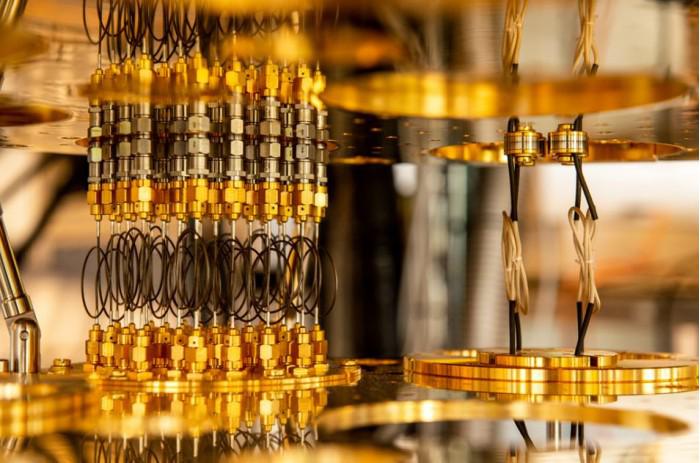For most of the field's history, quantum-computing research has been backed by governments or big information-technology firms.
縱觀該領域的歷史,量子計算研究大部分時間都是政府或大型信息技術企業在推動。
Increasingly, though, the venture-capital (vc) industry is showing an interest.
盡管如此,風險投資(Vc)行業也對這一領域表現出了越來越濃的興趣。
PitchBook, a research firm based in Seattle,
總部位于西雅圖的研究機構PitchBook
has tracked $495m of vc money that has been invested in quantum computing so far this year—
追蹤的結果顯示,今年以來,量子計算領域已經收到了4.95億美元的風投資金——
almost double last year's total.
幾乎是去年總額的兩倍。
Dozens of startups are competing with the incumbent tech giants.
還有數十家初創企業向當前的科技巨頭發起了競爭。
And established companies, such as Daimler, a carmaker, and Goldman Sachs, a bank,
老牌公司,如汽車制造商戴姆勒和高盛銀行,
are beginning to experiment with the nascent industry's products,
已經開始試水這一新興行業的各種產品,
hoping that, if they can master them, they will bestow an advantage over their competitors.
希望掌握了這些產品就能比各自的競爭對手搶先一步占據優勢。
Much of the money is going towards building hardware.
大部分資金都流向了打造硬件方面。
Doug Finke, a physicist who runs the Quantum Computing Report, which focuses on the nascent industry,
道格·芬克,物理學家兼《量子計算報告》——一份專注于量子計算這一新興行業動態的刊物——創刊人,
is aware of 87 organisations, big and small, trying to construct quantum computers.
就他了解,有87個大大小小的機構都在著手組建量子計算機。
Unlike classical computing, which had settled by the 1970s on silicon transistors as the units of computation,
與上世紀70年代就已基本定型的以硅晶體管為計算單位的經典計算不同的是,
there is, as yet, no consensus on the best way to build a quantum computer.
到目前為止,就搭建量子計算機的最佳方式這一問題的共識依然有待達成。

IonQ, a firm in Maryland that has raised $84m,
位于馬里蘭州的IonQ公司已經籌集到8400萬美元,
uses trapped ytterbium ions, manipulated by lasers, to perform its calculations.
通過使用被捕獲的,激光操控的鐿離子進行量子計算。
Rigetti Computing, a Californian company which announced earlier this month
位于加州,并于本月初宣布,
that it would be building a quantum computer for the British government,
將為英國政府搭建一臺量子計算機的(量子計算初創企業)Rigetti Computing
employs microwaves to control pairs of electrons flowing through superconducting circuits.
則是利用微波來控制流經超導電路的電子對。
Microsoft, although very much not a startup,
微軟,盡管算不上一家初創公司,
is working on a "topological" quantum computer that relies on the interactions of super-cold electrons.
也在研究一種依賴于超冷電子之間的相互作用的“拓撲”量子計算機。
One particularly well-financed new firm is PsiQuantum,
另外一家資金格外充裕的量子計算初創企業是PsiQuantum,
which does its computing with photons that run along waveguides etched onto ordinary silicon chips.
該公司研究的則是利用依靠蝕刻在普通硅片上的波導的光子進行量子計算。
It hopes to leapfrog the NISQ era entirely and produce a fully fledged quantum computer within about five years—
希望能借此完全跳過NISQ時代,將搭建一臺完全成熟的量子計算機的時間控制在五年之內——
though that is far sooner than most experts think feasible.
盡管大部分專家都認為實際所需的時間會遠長于五年。
PsiQuantum was founded in 2015 by researchers from Imperial College and the University of Bristol, both in Britain.
PsiQuantum創立于2015年,創始人均為來自英國帝國理工學院和布里斯托爾大學的研究人員。
It has raised $215m from backers including Black-Rock, a giant investment firm,
目前,該公司已經從巨型投資公司黑石,
and the Founders Fund, an American vc company that was an early investor in SpaceX and Facebook.
美國風投公司,SpaceX和Facebook的原始投資方“創始人基金”等支持者處籌集到了2.15億美元。
譯文由可可原創,僅供學習交流使用,未經許可請勿轉載。











